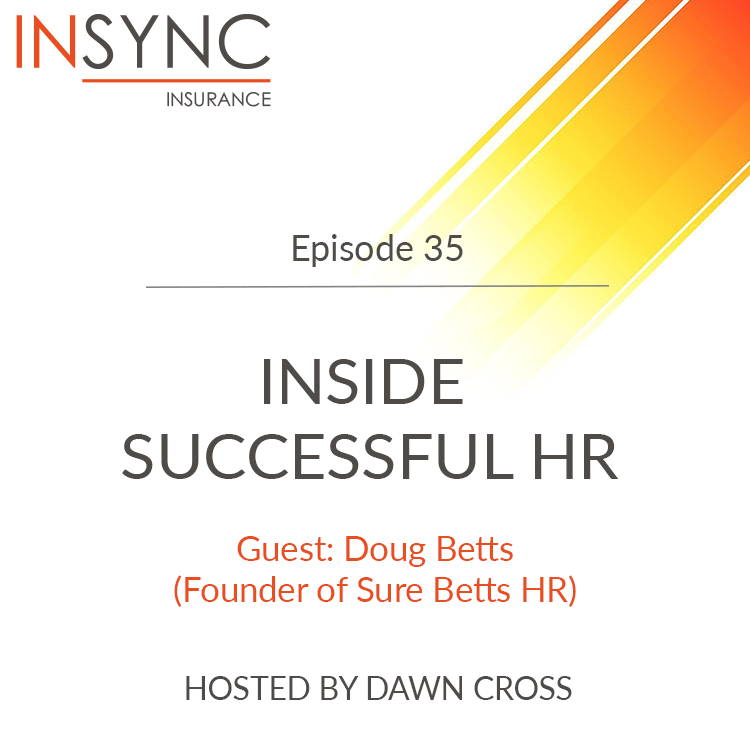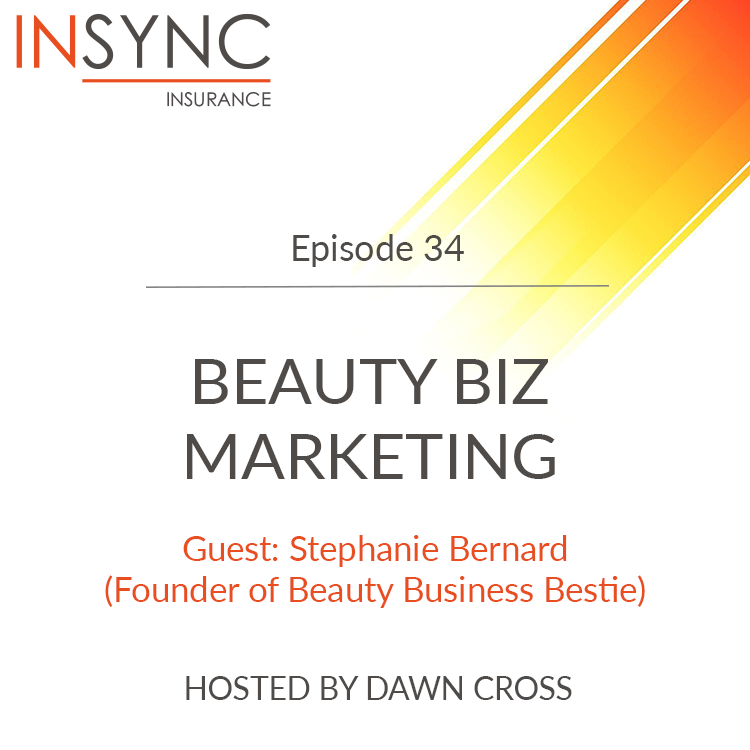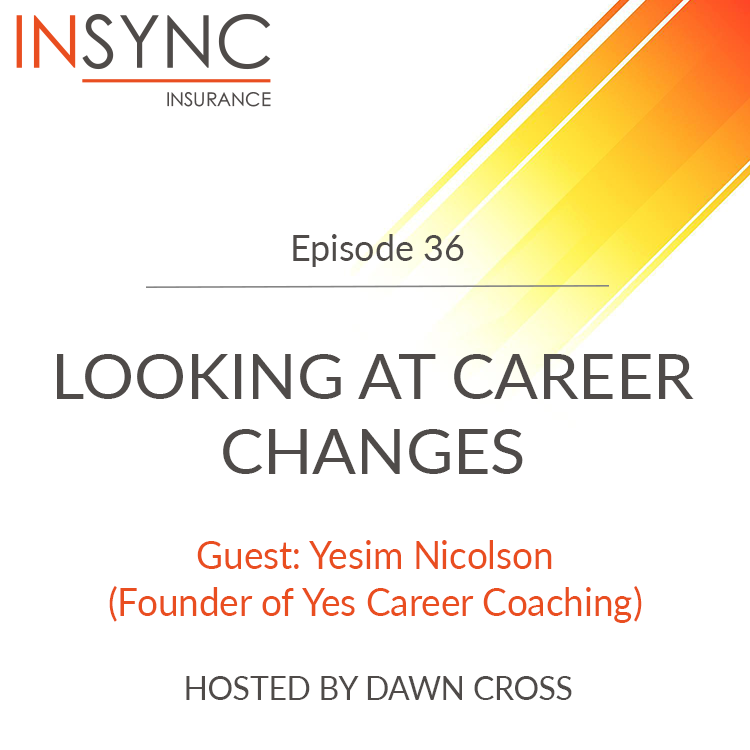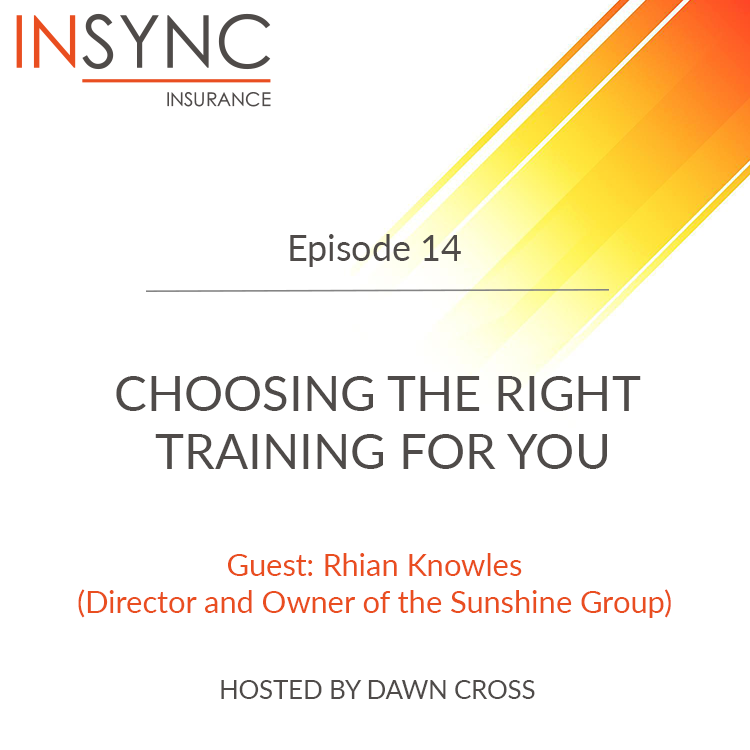Episode Transcript
[00:00:02] Speaker A: Welcome to the NSYNC Insurance podcast. I'm your host, Dawn Cross, and today I'll be discussing inside successful HR with Doug Betts, founder of the sure Betts HR Solutions.
If you love our podcast, make sure to leave a rating on your favourite podcast directory.
[00:00:21] Speaker B: Well, welcome to the podcast. If I could just get you to introduce yourself, your name and what you get up to your company.
[00:00:28] Speaker C: Hi, my name is Doug Betts and I'm the founder and lead director in my own company, Shaw Betts HR Solutions.
[00:00:36] Speaker B: That's brilliant. So what does your company get up to?
[00:00:40] Speaker C: So, essentially, I do two things in my company. I'm an HR consultant and I'm also a leadership coach. So for me, it's trying to work on a lot of prevention rather than cure when it comes to having good people practices in a workplace.
[00:00:54] Speaker B: That sounds amazing. So why is doing HR rights so important in this day and age for, like, any business, big or small?
[00:01:02] Speaker C: Because ultimately, people are the core of any business and it's as simple as that. And there's so many companies out there that don't invest in them, don't get it right, or don't see the value of what an HR person can do, or even understand what good HR is all about. And I think that's half my mission. I work in a very misunderstood profession, so I'm very keen to get out there and explain that actually being good at HR and getting the right things in place so your people have a great experience at work goes way beyond just having policies and ticking a compliance box. It's about so much more than that.
[00:01:36] Speaker B: Would you go into like, a little bit more depth about like, you know, what? What is it past the compliance and the tick box exercise, of course.
[00:01:44] Speaker C: So ultimately, it's making sure that your people have a great experience at work. So in turn, they feel valued, they feel they can do their best work, and it means that they won't want to run away and work for your competition and therefore should save you some money and time. So it sounds pretty basic, but it's amazing how many businesses just don't invest in that. And I think in terms of some of the tips for making people feel valued at work, it doesn't matter what industry you're in, what level of jobs you've got. It's about giving your employees some trust and empowering them to be able to solve problems, make decisions so that they actually feel satisfied in the work that they do. And there's so many companies get this wrong. They think if they give them free gym membership and a free pizza once a week, that's going to be enough to satisfy them. And it isn't. Fundamentally, none of that will make up for having a bad workplace culture. So for me, it's about getting that stuff right so people actually enjoy the job itself and then any other perks are an added bonus.
[00:02:43] Speaker B: That sounds amazing. I like the idea that it's time of, you know, you're trying to get to the core of things instead of being like, oh, if there's some free stuff, I'm sure that they'll feel valued and, you know, it's like trying to put a band aid over a very big problem. That's.
[00:02:58] Speaker C: Yeah, absolutely.
[00:03:01] Speaker B: That's great. So I guess I'd like to ask you a little bit more in depth. So, obviously you've got a lot of smaller businesses. They may not be able to have or just have the resources to have, like a full on HR person. So, you know, especially for startups and that sort of thing, it tends to fall on kind of everybody almost. So my question is for you, you know, how can small businesses, you know, do HR without actually having a HR person?
[00:03:28] Speaker C: So there's certain things a business can do itself, but ultimately you don't need a full time HR person in house. You can use a consultant like myself because I come at a fraction of the cost, but I've got the experience, and then you dip in and out of my knowledge as and when you need me. So again, I go beyond the compliance bit, making sure that not only have we got the basics in place, but you get things set up from day one. And I've worked with a lot of businesses in this way, so they know that I'm there when they need me, but I'm not when they're not, because, as you say, you don't need it full time. But I think the other thing I would say to any business owner is it's worth investing in expert advice at all levels about all the disciplines. And again, with HR, people think that it's something that can be done by the company secretary, the finance director, as an add on, but they're not people experts. And it always surprises me when businesses try and do this and then they find it's all gone wrong. It just takes one grievance, one discipled employee, and they haven't got that expertise. And whereas doing an outsourced service like the one I provide will give them that opportunity to do it without it breaking the bank.
And I think as an HR consultant, no one's ever asked me to produce a set of accounts, ever. So it's always a mystery to me why people think the finance director can do HR because it's a complete different kind of skill set. I mean, yes, there is a link between them, but ultimately it is a specialism in its own right. And I think as a business owner myself, I invest in specialists where I don't have the skill set and I'd always encourage businesses to do the same. But I mean, as a starting point, I would say, yeah, make sure you treat your people right and you give them the right kind of experience that will help them want to stay put with you and will attract them to work with you in the first place. And then you get all your other things lined up around it. You don't need to go policy heavy. I'm a big believer in not having massive handbooks and policies. That's not doing HR, but it's making sure you're legally compliant but your employees are happy and that should be your starting point. Point.
[00:05:28] Speaker B: That sounds amazing. Do you have any tips on, I guess, how to be more kind of people focused? So, you know, for example, you've got like small business and obviously they're, they're still getting to grips with, you know, probably running a business, especially if they've hadn't had much experience before, but obviously wanting to make sure that everybody's looked after what some tips you saved people to get started with other than obviously legal compliance and making sure those bits are ticked off.
[00:05:55] Speaker C: I think it's about putting yourself in the employees shoes and thinking about how they'd feel and about what experience they will have and what their perception is of your company. Because if you're a business owner, no one's going to be more passionate about your business than you are. Whereas an employee, they might just want to come on, do their best work and take the money and go home again, and that's fine as well. But it's also thinking about what can you do to help them.
I think it's really start from seeing it in their shoes from the moment you hire. Think about the language you use in your job adverts. Is that appropriate? Is it going to make them want to work for you? Does it sum up what you are as a company? And I think the best tip I can give you as a starter is try and work out what your mission, your vision, your own values are for your business and what you want it to achieve. Because if you don't know that, your employees certainly aren't going to. And you could end up with a mismatch in there. So I think that's the starting point. And then, yeah, work out about each phase of their employee journey with you, how you want them to grow, how you want them to develop. And I think essentially treating them like a human being, you don't want to mismatch where you've got lots of great ideas and they love working for you as an individual, but all your policies and all your things in the background sound very authoritarian and not in line with what you stand for. So it's important to kind of get that link right so they don't see that disconnect and they actually want to come to work each day and they enjoy working for you.
[00:07:18] Speaker B: Well, definitely. I think as an add on as well, it's really good to just have that open mind as well that, you know, even if they do come up with a grievance or there's been like, you know, this process isn't particularly rape or fun, instead of kind of taking that to heart and being like, oh, you know, I've got stuff, you know, thinking that they're making bus and thing like, I think, yeah, just being open to listen and even just like, to take on the criticism because at the end of the day, like, you know, you're not going to get it perfect first time around, second time around, it's going to take years probably, to perfect the whole process and make sure everyone's happy. But even then, there's still going to be something that pops up. So I think that's something really to consider as well, from what you said.
[00:07:59] Speaker C: Definitely. And how you operate your business depends on how big you are and how much you grow. And I've seen problem I've seen in businesses when I've worked with larger ones about growing pains as well, because you might have a couple of hundred staff working for you, but you still behave like you're a startup in somebody's back bedroom, and that's not good either. So when you know that if you've got plans to expand your culture and how you do things expands with it. So, for example, if you've got one or two employees, you can probably get away with recording their holiday on a spreadsheet. When you get bigger than that, you're going to want something more sophisticated. So you don't become admin burden heavy, because ultimately you want to spend money on your staff's time, them doing their best work, and them doing things that will help your business grow, not getting stuck in admin procedures. So again, it's making sure you've got that kind of mind and growth mindset as you grow and your business grows.
[00:08:49] Speaker B: Definitely. And I think as well, like a lot of businesses I've seen just from my perspective, is that, you know, if you don't invest in your employees, then everything else will kind of come to a standstill. You'll have, like you said, the growing pains because, you know, they are the ones that essentially help run the business. And if they're unhappy, then everything else is not going to meet targets or whatever, because at the end of the day, you know, it's your employees that will help produce the best work, get those clients, that sort of thing.
[00:09:17] Speaker C: Yeah, exactly. And you've also, as a business owner, got to be willing to listen to their feedback as well, whether you want to hear it or not. Because I think the worst kind of leaders I've worked with are the ones who recruit, yes. People around them who don't disagree with them or don't feel that they can. And actually, I know from my own experiences I've grown as a people leader by taking on board constructive proof criticism from other people. I don't want to be told I'm good all the time. I need to know where I can get better. Because that's how you grow, definitely.
[00:09:42] Speaker B: I think a lot of people forget that, you know, even if, yes, you've got the business started and everything else, you still need to be able to grow and learn and continue to change with the environment or if the industry changes new regulations, that sort of thing, you need to work with it, not against it, and then you will continue to do be established. Whereas, you know, we've been speaking with other people on the podcast so far, and it's like, you know, especially those who are, you know, resistance, change, and everything else is going to be hitting the hardest, I think, of all.
[00:10:16] Speaker C: Absolutely. I mean, the last four years have shown us just how much businesses have had to change literally overnight. And as a wise person once said to me years ago, if you stand still and you move forward, you actually go backwards between because you're just going to be left behind. So it's always important to know sort of what is going on in your industry, how it's evolving and making sure that you stay up to date with it and also with what's good practice and also what employees are looking for out of an experience of coming to work. I mean, for example, now, depending on the type of work you do, most people will be looking for hybrid working. And if you don't offer that, then you're going to be at a complete.
[00:10:50] Speaker B: Disadvantage, definitely, as well. And I think obviously you've got that change of everybody finding out that hybrid does work better for them. Working from home is really good. It's fuel efficient. You know, they're happier because, you know, sometimes the office environment is too much and too stimulating, and they just need that folks space at home to chill out. Or maybe their child is sick, but they can still work and they don't want to take an off day, but they just need to be at home sort of things. Being able to work around families better as well is such a key thing.
[00:11:21] Speaker C: Yeah, I completely agree, and it's something I've been a big advocate of. And it's just getting people to get into the mindset of trusting their employees that they don't have to be under their nose to do the best work. And actually now technology has evolved. We couldn't have done this 20 years ago because we still all had fax machines, filing cabinets, whiteboards, in offices. We all had desktop computers. Whereas now, with the way technology's moved on, we can pretty much work from anywhere. And don't get me wrong, there's a lot to be said for coming into an office and collaborating with people as well, or picking up on information that you wouldn't hear if you were working at home. So I support that completely as well. But I think it's getting to this concept of treating your employees like adults and trusting them to make the right decisions about where and how they work. And for me, it now seems crazy. Not everybody does their best work between nine and five. So if you have people who are naturally better in the mornings or better in the evenings, you let them work in those times, in those locations, and you get more out of them than if you force them to come into an office for five days a week.
It's just that change. And for me, it now seems crazy if you work full time, that you can only do your life admin at the weekend. It should be something that in theory, you can sort of intersperse with doing work. And you might work longer days, but you might have more breaks in the middle if you need to do bits and pieces. So, yeah, it's knowing that we've got the technology to do it now and getting business owners to use that to their advantage in terms of getting the top talent in to want to work for them.
[00:12:49] Speaker B: Well, definitely. And if you think about, you know, flexible hours like you were, you know, talking about, you know, especially with those neurodiverse people, like, it would really benefit them. And, you know, a lot of them, you know, well, majority of them, not all of them, like, you know, have really great passion, are happy to work and stuff. But obviously if they can't, if they can't do the nine to five, obviously, like, they're excluded from a lot of jobs instantly because the jobs aren't willing to work with it. And then, you know, they've missed out on potentially a really great employee.
[00:13:20] Speaker C: Exactly. And I think it's great that we recognize neurodiversity now far more than we ever did.
These are people whose brains are wired in a slightly different way. And that's great because you, again, you've got different perspectives on things, and I think as long as you understand those individuals and how they can do their best work and make that happen, it's great. For example, I've worked with a lot of software companies, and some of their best development developers come under that category, but they would rather be crunching data in a broom cupboard at 04:00 in the morning than they would do being in a bright office at 09:00 on a Monday morning. So it's, again, that kind of flexibility to do that.
[00:13:55] Speaker B: Yeah, it's amazing. So before we wrap up the episode, I wanted to ask briefly about your book. Obviously, you've got the gorgeous purple background going on in the book on there, so if I could pick your brain a little bit about that. What's the book about?
[00:14:09] Speaker C: So for me, it was my way of wanting to work on prevention rather than cure in businesses, because I've talked a lot already about some of the issues you can get in businesses. But most problems in businesses come down, I think, to people, managers and their issues, because every problem in a business is ultimately a leadership problem, and whether that's a first line team leader person or a CEO, fundamentally the issues are the same. A line manager can make or break an employee's experience at work. And so many of them get promoted into jobs because they're technically good at what they do or they've been there a long time. But a lot of companies don't think to invest in them in the right way in terms of making them good people managers. Some of them might do it with the best will in the world, but will make inadvertent mistakes and won't understand how people work and how to get the best out of their team. Others will see it as a power trip and they will not give a second thought to it. They'll just look at the status of the job title or the pay. So this was my attempt to try and fix some of that. So I've used the book as a way of getting into businesses and doing proper leadership training with them. And I'm about to launch my first sort of ten week program for people to come along. And, you know, my first online session is going to be free of charge and then it's like ten weeks after that if people want to sign up to it. And for me, it's about giving people really good, practical tips rather than putting them in the classroom and giving them generic theories. This was about getting them to learn to do some really basic things early on, like how do you recruit somebody in the right way? How do you deal with an employee who's always off sick? How do you deal with your ambitious employees who want to develop? How do you still make sure that your employees who don't want to develop the still come along with you on the journey and are a valuable part of your team? So it's dealing with those kind of problems and the book is an introduction into that, definitely.
[00:16:02] Speaker B: That sounds absolutely amazing. So I'm guessing obviously you can find it on Amazon. Is there any other retailers that they can find at all?
[00:16:08] Speaker C: It's just on Amazon at the moment. So you can either get it as an e book or you can get a paper copy posted to you. I'm also working on an audible version of it as well at the moment.
[00:16:18] Speaker B: Oh, that's brilliant. I love it. So be literally in all sorts of formats probably by the time that this episode comes out. Yeah, that's brilliant. Is there any other kind of lasting bits of advice you'd like to add before we wrap up the episode today?
[00:16:31] Speaker C: I think the one bit of advice I would say to any people leader anywhere, or whether it's a business owner or a team leader, is if you're not sure about how to deal with an employee issue, ask. Don't just jump in. Don't think you can google the answer because it's not always out there. It's not always fine. Use a people expert and if you don't need one full time, that's fine. But use somebody like me as a sounding board because it's far better to come in prepared rather than think you know what you're doing or fudge it and then not be certain. So I want to help give people like you that confidence to be able to make the right decisions for your team and do the right thing.
[00:17:07] Speaker B: That sounds great. Well, thank you so, so much for coming. On today.
[00:17:10] Speaker C: Thank you for having me, it's been great.
[00:17:14] Speaker A: Thank you to my guest today, Doug Burtz, for chatting about its HR consultancy company and tips to successful HR practices for businesses big and small. If you're interested in his new book, please click the link in the description.
I'm your host Don Cross and tune in next week for another episode.
NSYNC is one of the UK's fastest growing insurance providers, offering comprehensive cover for SME's and self employed across the UK. Our expert team can tailor your insurance to meet your individual business needs and compare prices. From Alois of London approved partners, we offer a five star service and have been FIFO platinum trusted winners five years in a row.





